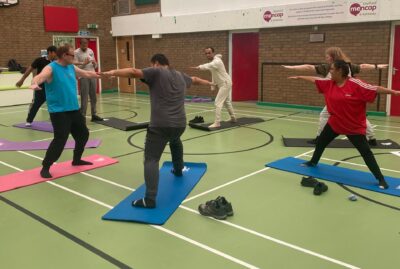Everyone can struggle with mental health issues – including people with learning disabilities and autistic people. To mark World Mental Health Day (10th October 2025) we want to raise awareness of mental health for people with a learning disability and autistic people. Wellbeing is one of our core values at Sheffield Mencap and Gateway, and that includes supporting the learning disability and autistic community to have better mental health.
Mental Health Matters
People with learning disabilities are more likely to have mental health issues than other people, with around 1 in 2 people with a learning disability experiencing a mental health problem at some point in their life. Sadly, many of these people don’t get the help they need – sometimes because their distress is mistakenly thought of as “just part of the disability.”
Autistic people also have higher rates of mental health issues sthan the wider population. The recently published LeDer Report found that 54% of autistic adults had a diagnosis of depression, and 43% had a diagnosis of anxiety. Worrying, the report also found that, of autistic adults with a LeDer review between 2021 – 2023, the most common cause of death at 29% of the cohort was ‘suicide, misadventure or accidental death’.
It is critical that people with a learning disability and autistic people are able to access the support they need to manage mental health conditions and live happier, healthier lives.
Signs someone might be struggling
Everyone shows distress differently, but look out for:
- Changes in sleep or appetite
- Feeling sad, angry or worried more than usual
- Avoiding people or usual activities
- More meltdowns, shouting, or self-harm
- Saying things like “I feel bad” or “I don’t want to be here”
If something feels different or worrying, it’s okay to ask for help.
How to look after your mental health
Small things can make a big difference:
- Keep a routine – having structure can reduce stress.
- Stay active – gentle exercise, hobbies, and getting outside help your mood.
- Stay connected – spend time with friends, family, or join local groups.
- Talk about how you feel – use words, pictures, music, or whatever works for you.
- Take breaks – quiet time, sensory spaces, or relaxation can calm your mind.
- Eat and sleep well – your body and mind work together.

Getting support in Sheffield
If you’re struggling, you are not alone. There is help available:
- At Sheffield Mencap and Gateway we have a range of friendly groups, activities, and support for adults and children with learning disabilities and autism. Being part of a community can help build confidence and reduce loneliness.
- Our Health Services can support you to make and attend an appointment at your GP surgery, where you can get specialist mental health support.
- In a crisis, contact NHS 111 (option 2) or 999 in an emergency.
For carers and families
If you support someone with a learning disability or autism:
- Notice changes in mood or behaviour.
- Listen and take feelings seriously.
- Help them find activities and support that make them feel safe and valued.
- Look after your own wellbeing, too.
- Sheffield Mencap and Gateway’s Carers Team are here for you. We have a range of groups to boost your wellbeing, as well as 1-2-1 support when you need it.
For more information about any of the services, support or activities at Shefield Mencap and Gateway mentioned in this article, please explore our website or contact us.




